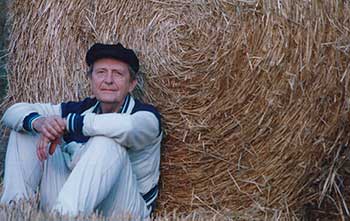Using Native American Concepts to Help Explain the Unexplainable
by Julie Lineback
The University of West Georgia’s Department of Psychology held its annual Bill Roll Lecture on Thursday, October 23 in the Technology-Enhanced Learning Center. Dr. Stanley Krippner, eminent psychologist in consciousness studies, parapsychology, and transpersonal psychology, spoke on the Native American model “long body” and how Dr. Roll used this to explain parapsychological experiences and psychic phenomena.
 Dr. Christopher Aanstoos, close friend of Dr. Roll and professor of psychology at UWG, opened the lecture. Dr. Aanstoos introduced the term “long body” as a parapsychological concept at a 1986 conference at then-West Georgia College. The phrase is derived from the unique Native American concept of self in that one’s identity did not lie in separate individuals, but in their relatives and community members, both living and deceased, and even sacred objects and places. Collectively, they were seen as one organism, or one “long body.”
Dr. Christopher Aanstoos, close friend of Dr. Roll and professor of psychology at UWG, opened the lecture. Dr. Aanstoos introduced the term “long body” as a parapsychological concept at a 1986 conference at then-West Georgia College. The phrase is derived from the unique Native American concept of self in that one’s identity did not lie in separate individuals, but in their relatives and community members, both living and deceased, and even sacred objects and places. Collectively, they were seen as one organism, or one “long body.”
Dr. Roll went on to refer to and expound on Dr. Aanstoos’s findings at an American Psychological Association convention and in a series of subsequent articles. Dr. Roll also believed that memory played a large part in psi phenomena, such as extrasensory perception, psychokinesis, and past life and out-of-body experiences.
“Memory is the ‘long body’ stretched out in time, into the future, as well as the past. Memory connects someone to a physical object and may provide the means to affect it,” Dr. Krippner explained. “Memory is personal and individual, but it is also transpersonal and provides an opening to transcendent experiences. Memory is transpersonal because one’s personal history includes other people and objects.”
Dr. Krippner is a fellow in four American Psychological Association divisions and past-president of two divisions. Formerly, he was director of the Kent State University Child Study Center in Kent, Ohio, and the Maimonides Medical Center Dream Research Laboratory in Brooklyn, New York. He has written extensively on many parapsychological subjects including altered states of consciousness, dream telepathy, hypnosis, and shamanism.
Often, Dr. Roll would cite student reports in his research. Throughout the lecture Dr. Krippner interweaved stories of Dr. Roll’s students and their experiences with “long body” psi phenomena. One student dreamt she had sand thrown in her face at the same instant her fiancée was hit by sand that was being loaded into a mixing machine. Another example included a student who had a vision of a man falling off a motorcycle and felt compelled to call a friend. The friend’s father died days later after suffering a heart attack while falling off his motorcycle. While the student did not know her friend’s father, she was part of her friend’s “long body.”
The lecture series is a tribute to the late Dr. William Roll, who taught at the University of West Georgia from the ‘80s until his retirement in the 2000s. His interest in the paranormal began when he had his first out-of-body experience at 16. After receiving his Ph.D., he studied psychic phenomena at Oxford in 1950. In 1957, he moved to North Carolina to join the Parapsychology Laboratory at Duke University. He was a founding member of the Parapsychological Association’s council. He was prolific in writing about parapsychology, and many popular shows about the paranormal invited Dr. Roll to be a consultant.
“Another bonus of Dr. Roll coming to West Georgia is that he suddenly had a subject pool that he could survey and that could provide information for his investigations,” Dr. Krippner observed. “I think some of Dr. Roll’s best work, and certainly some of his best theoretical work, was done while he was at West Georgia.”
Do you have a comment or opinion about this story's topic? Perspective Online wants to hear from you. Submit a letter to the editor at perspect@westga.edu today.
